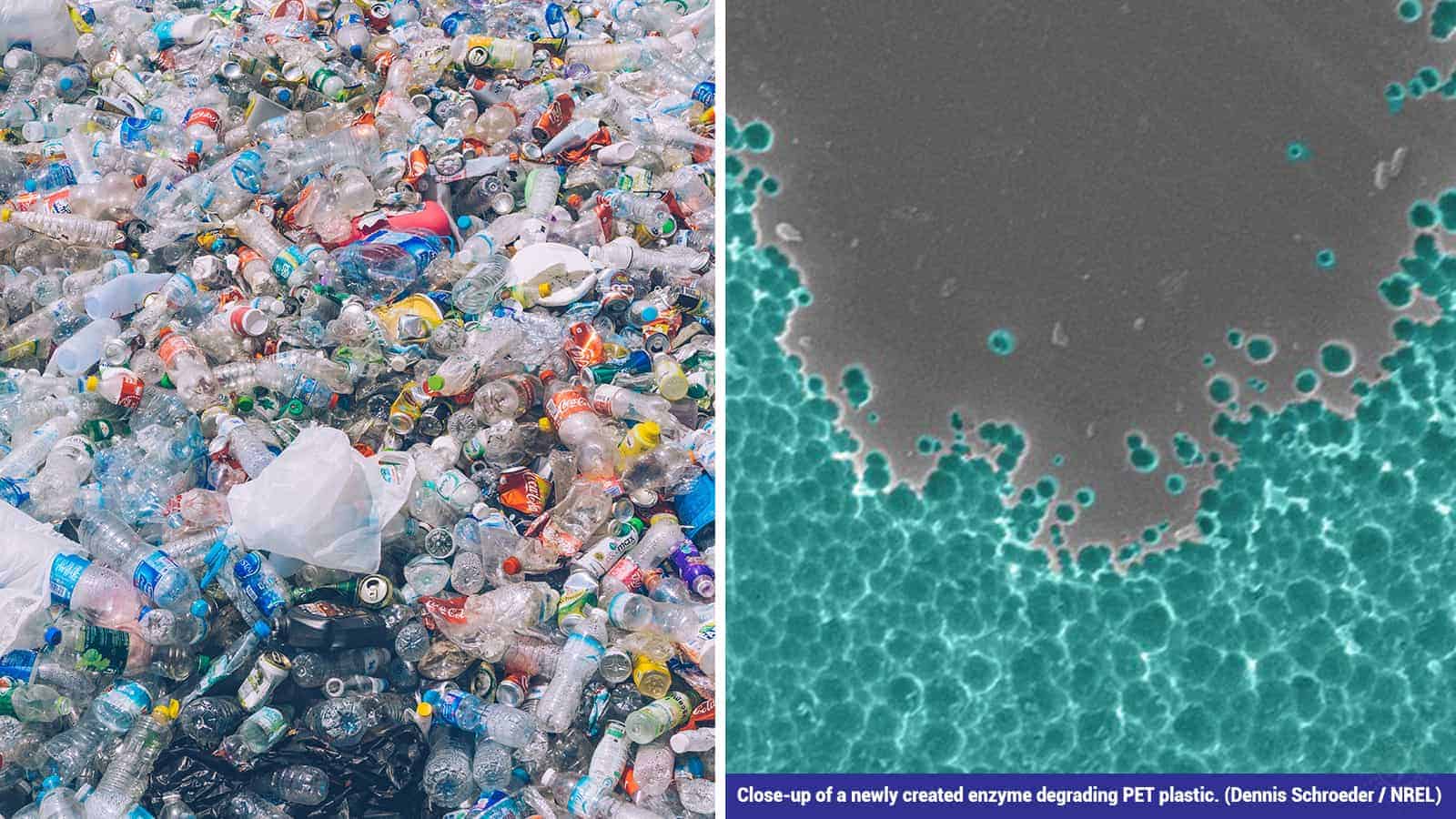Scientists have recently created a “super enzyme” that can break down plastic in a matter of days. In fact, it breaks down plastic up to six times faster than an enzyme they’d created previously. The team of scientists from the University of Portsmouth re-engineered a plastic-eating enzyme called PETase. To speed up the plastic-eating process, they combined it with the new enzyme.
The super enzyme could help provide a simple solution for recycling polyethylene terephthalate (PET), the most common thermoplastic used in single-use plastic bottles, carpets, and clothing. While it’s cheap to produce, it takes hundreds of years to break down in the environment.
However, PETase can break it down in just a few days.
Professor John McGeehan, lead co-author and director of the Centre for Enzyme Innovation at the University of Portsmouth, helped develop PETase in 2018. Along with other scientists, he created the enzyme entirely by accident while trying to mutate it in a laboratory. The team hoped the unexpected finding would finally solve the plastic pollution crisis.
They engineered the natural PETase enzyme to break down PET 20% faster, but the new super enzyme delivers even better results. McGeehan told CNN that it works pretty well in breaking down plastic but still needs tweaking for commercial use.
However, scientists will keep conducting experiments to fine-tune the process. Successful developments could lead to existing PET being recycled instead of digging up more fossil fuels for plastic production. This would result in “huge energy savings,” according to McGeehan.
How the super enzyme breaks down plastic in only days
The super enzyme combines PETase and MHETase, an enzyme found in bacteria that feed on plastic. The combination of these enzymes causes PET to decompose twice as fast as PETase alone. However, fusing the two enzymes created an even faster breakdown process, increasing the speed by three times.Scientists who originally engineered PETase took part in the study. It included Professor John McGeehan from the Centre for Enzyme Innovation and Dr. Gregg Beckham, Senior Research Fellow at the National Renewable Energy Laboratory (NREL) in the US. The Centre for Enzyme Innovation takes enzymes from the natural environment and engineers them to create new enzymes using synthetic biology.
The journal Proceedings of the National Academy of Sciences of the United States of America published the entire study.
Professor McGeehan said: “Gregg and I were chatting about how PETase attacks the surface of the plastics and MHETase chops things up further, so it seemed natural to see if we could use them together, mimicking what happens in nature.
“Our first experiments showed that they did indeed work better together, so we decided to try to physically link them, like two Pac-men joined by a piece of string. It took a great deal of work on both sides of the Atlantic, but it was worth the effort – we were delighted to see that our new chimeric enzyme is up to three times faster than the naturally evolved separate enzymes, opening new avenues for further improvements.”
The original PETase enzyme discovery provided hope that a solution to the plastic pollution crisis was on the horizon. However, PETase alone can’t work fast enough to eat through the mountains of PET bottles scattered across the globe. By combining it with the MHETase enzyme, scientists have gotten even closer to finding a solution to plastic waste.
How the ‘super enzyme’ was created
Both MHETase and PETase come from a bacteria that feeds on PET plastic called Ideonella Sakaiensis. Fusing the enzymes allows them to digest the plastic at much faster rates. Then, the plastic returns to its original building blocks, which allows for endless reuse and recycling. This would drastically reduce our dependence on fossil fuels like oil and gas.
To develop the super enzyme, Professor McGeehan used the Diamond Light Source in Oxfordshire, a device that uses intense beams of X-rays 10 billion times brighter than the Sun. It acts like a microscope, able to see individual atoms. This device helped the team map the molecular structure of the MHETase enzyme, giving them the blueprints to engineer the supercharged enzyme.
To do this, they essentially stitched the DNA of the two enzymes together to create a long chain. The biofuels industry often utilizes this technique to break down cellulases. However, McGeehan explained that the study marks the first in history to use enzymes for breaking down plastic.
This groundbreaking research involved scientific approaches, including structural, computational, biochemical, and bioinformatics. It provided insight into the molecular structure and function of the enzymes, which will help with further research. Perhaps in a few years, we’ll see the super enzyme being incorporated into recycling efforts.
Other solutions to break down plastic in the environment
Plastic pollution affects every part of the globe, and it seems that it will only worsen, unfortunately. A recent report from The Pew Charitable Trusts estimated that the plastic volume in the oceans could nearly triple to 29 million metric tons per year by 2040. This total equates to a staggering 50 kilograms of plastic for every meter of coastline around the world. However, the report said that an aggressive, wide-reaching recycling strategy could reduce plastic pollution by 31-45%.
In April 2020, French recycling firm Carbios published a study on its PET-eating enzyme. They will test it at a demonstration plant near the city of Lyon sometime this year. The company hopes to adopt industrial-scale recycling within five years.
The waxworm, a member of the caterpillar family, could also provide a solution to the plastic waste problem. It can eat through many plastics, including polyethylene, one of the most pervasive plastics polluting waterways and landfills. The worms have certain gut bacteria which can effectively digest the plastic.
Final thoughts on the super enzyme that can break down plastic in mere days
Finding a way to clean up plastics littering the planet is one of the most urgent matters of modern times. Luckily, it seems scientists are on the right track. The new super enzyme they’ve created may help reduce plastic waste. If they can scale the process, perhaps we can have a plastic-free world sooner than we think.
















 Community
Community

